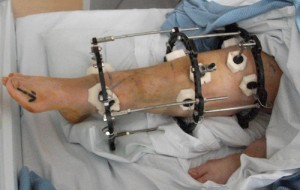It isn’t often that the newspaper provides ideas for this site, whose focus is polishing new bankruptcy lawyers.
But a story on the surge in cost for health insurance based on a study by the Commonwealth Fund reminded me to remind you: the means test allows deduction for the cost of health insurance, even if the debtor doesn’t have health insurance!
The opportunity to deduct expenses that the debtor ought to have is a gift to our clients from the late Senator Ted Kennedy who introduced this tweak to the §707(b) list of allowable expenses when BAPCPA was taking shape in Congress.
This section embodies the idea that no filing is abusive unless there is money left after the debtor provides “reasonably necessary” health insurance; disability insurance; and a health savings account. On the B-22 A, this provision is found in Line 34.
Like most of BAPCPA, the statute is not a model of clarity. Here’s what the committee notes of the form drafters say:
In addition to the expense deductions allowed under the IRS standards, the means test makes provision—in subclauses (I), (II), (IV), and (V) of § 707(b)(2)(A)(ii)—for six special expense deductions. Each of these additional expense items is set out on a separate entry line in Subpart B, introduced by an instruction that tracks the statutory language and provides that there should not be double counting of any expense already included in the IRS deductions.
One of these special expense deductions presents a problem of statutory construction. Section 707(b)(2)A)(ii)(I), after directing the calculation of the debtor’s monthly expenses under the IRS standards, states, “Such expenses shall include reasonably necessary health insurance, disability insurance, and health saving account expenses . . . .” There is no express statutory limitation to expenses actually incurred by the debtor, and so the provision appears to allow a reasonable “monthly expense” deduction for health and disability insurance or a health savings account even if the debtor does not make such payments, similar to the way in which the National Standards give an allowance for food, clothing and personal care expenses without regard to the debtor’s actual expenditures. However, the statutory language might also be read as providing that the debtor’s “Other Necessary Expenses” should include reasonable insurance and health savings account payments. Since “Other Necessary Expenses” are limited to actual expenditures, such a limitation could be implied here. The forms deal with this ambiguity by allowing the debtor to claim a deduction for reasonable insurance and health savings account expenses even if not made, but also require a statement of the amount actually expended in these categories, thus allowing a challenge by any party who believes that only actual expenditures are properly deductible.
The last time I checked, there are no reported cases interpreting this provision of 707(b), so you are writing on a clean slate. If challenged, the debtor certainly has right and decency on their side: no payments to unsecured creditors while the debtor is uninsured.
Given the cost increases in health insurance that the news story sets out, an allowance for health insurance for an above median debtor without should swing your means test results significantly.
Image courtesy of Carlos62









while this is a good idea, with the way trustees scrutinize Chapter 13 cases, I’d be sure the debtor starts by getting a health plan, and making a payment or two. Then I would be able to defend it better, as to the payments being made, and the reasonableness of the cost. Dan Winter
If possible, that’s clearly preferable, but my point is that if the client doesn’t have it and doesn’t have the money right now to get insurance, you can deduct the reasonable cost anyway.
I like your point, Cathy, but I have to say that I also see the point Dan is making. If you have an above-median debtor, then according to the means test they should have some money left over for a Chapter 13 payment. If you, as the debtor’s counsel, wish to have that money earmarked for health insurance and it barely covers the difference on the B22A, then I think that you may only get the judge’s sympathy if you are in fact making that expenditure. Otherwise, you may face the unwanted challenge of explaining in court where that money is going if it isn’t really being spent on health insurance.
True, but we know the means test vision of expenses is a fiction. Don’t get sucked into believing that it’s real.
If you allow confirmation of a plan that sucks up the money needed to obtain health insurance, you’ve just allowed the system to gamble that nothing untoward will happen to your client or his family in a five year plan.
Obviously, you would want to include a projected necessary health insurance expense on the B22C when calculating a Chapter 13 Means Test. However, we’re talking about a provision of Chapter 7 on the B22A, and I’ve always thought of it as a snapshot on the day of filing. The new interpretation represents a forced shift in the logic that most judges and trustees have used under BAPCPA up to this point.
Especially because it has likely not been argued and ruled upon in most jurisdictions, I think that as well prepared bankruptcy practitioners we must enter the 341 Meeting with an answer regarding this deduction. This includes an explanation of why the number is projected as well as what is being done with the money instead of being utilized in the way that we have stated. We can’t forget that but for the deduction the debtor would be forced into a Chapter 13 and would fill out the B22C (under which you can take a deduction for retirement contributions as well, and the client may have a minimal payment as a result). Judges and trustees aren’t likely to be accepting initially of the idea that debtors can deduct an expense they don’t actually have in a Chapter 7. We have to help them get there though.
Ultimately, Cathy, I agree with your point, and believe that a debtor is entitled to the expenditure. I just think that we have to expect where the challenges will come from, and be prepared to fight the battle. Remember, bad facts make bad law. Know beforehand that the case you are testing this on has good facts.
The healthcare exemption would obviously benefit the above median chapter 7 debtor. I like Cathy’s representation of the exemption.
The debtor shouldn’t have to demonstrate that the health care expense is actively being incurred at the time of filing. Whether the expense is incurred presently or in the future, it doesn’t take away from the healthcare expense being “reasonably necessary” and the exemption should apply.
I think this is extremely helpful. Thank you.
My interpretation is that ALL expenses in the means test are forward looking. That makes the health care that the debtor needs but didn’t get because he was paying Discover an element of the projected expenses.
I hardly ever interview a bankruptcy client who doesn’t have “deferred maintenance” on his body: dental work that’s required, prescriptions unfilled, lab tests needed but deferred. It’s the single most productive line on the means test for increasing deductions.